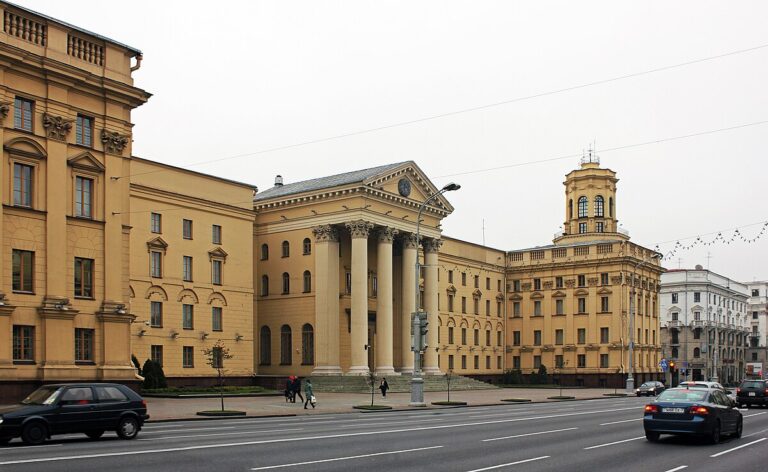According to Forum 18, Belarus banned the rights group’s Christian vision and labeled it as “extremist” for documenting the abuse of religious freedom by the Belarusian secret police.
The Republic of Belarus (KGB RB) National Security Committee raided the home of a relative of Christian visionary activists formed in September 2020 by human rights defenders of Belarus’ churches during protests against a “false” presidential election.
In a ruling between August 2023 and March 2024, several courts labeling the Christian organization’s telegrams, Instagram, Facebook, Twitter, Vkontakte, Odnoklassniki accounts, and their logos as “extremists,” KGB RB agreed to these decisions and declared “extremists” on April 1.
Three linked to Christian Vision, all Orthodox Christians outside Belarus, were added to the Home Office’s “extremists” list on April 8th: Natalia Vasirevich, Natalia Harkovic and Ditricolnienko.
The Christian vision has not been informed of the declaration of “extremism” by the KGB RB, the Ministry of Home Affairs or the court, Forum 18 reported.
Vasirevich, an orthodox theologian and human rights advocate who is the group’s coordinator, told Forum 18 on May 6.
Vasilevich said that extremism allegations do not thwart the work of Christian vision, but could undermine the safety of Belarusian colleagues.
“We may endanger the situation for Christians in Belarus who work with us to inform us,” Vasirevich told Forum 18.
This decision could also affect religious freedom and oversight of belief violations.
“Currently, information from the ground is the only source of persecution,” Vasilevich said.
Police reportedly attacked three relatives of Dzmitry Korneyenko, one of the Christian vision members identified by the KGB RB and mentioned above. Officers collected DNA samples from their father, Victor Korneienko, in the town of Orsha on April 9th and in the town of Orsha on April 23rd.
“When (my brother) asked the police why he needed his DNA, they replied that it made it easier for them to hunt me,” Corneyenko told Forum 18.
Korneyenko posted on Facebook (April 10th). His father was too confused to ask Orsha police why he needed DNA, but his brother tried to find out.
“When he asked the police why he needed his DNA, they replied that it made it easier for them to hunt me,” Korneyenko said according to Forum 18.
Orsha district police refused to tell Forum 18 why the officers visited Korneyenko’s relatives and why they needed DNA samples. Forum 18 contacted Orsha District Police Commissioner, who reportedly refused to answer questions about why the officers visited Corneyenko’s relatives and why DNA samples were needed. He introduced Forum 18 to Dmitry Borodavko, the district police chief, but he did not answer the phone.
Korneyenko said that police attacks on relatives occurred before “various frequencies” were common, but this was the first time that DNA was photographed: “It’s new.”
Korneienko is also involved in the Christian War, a project endorsed by a Christian vision documenting the persecution of both Russian and Belarusian clergy and other Christians against Russia’s invasion of Ukraine. A Belarusian court last year declared the project “extremist.”
Russia put Korneienko on the country’s federal wanted list after several criminal cases were launched against him, reported Forum 18.
Orthodox activists are also involved in another organisation labelled extremists, known as representatives of those who monitor local government activities. The KGB RB declared it “extremist” on April 21st.
“In fact, I’ve currently been in a radical formation three times,” Corneyenko said on Facebook on May 2.
Forum 18 attempted to contact the secret police of the KGB RB, the executive director of Natalya Sakharchuk and the representatives of the Ministry of Home Affairs, as well as the Almighty of Aleksandr Rumakalso, all of the religion and ethnicity in Minsk. Rights groups did not respond to enquiries about crackdowns.
According to Forum 18, extremism can be applied to “any area of human activity,” citing Article 12 of the new religious law enacted on July 5th.
Anyone who shares, copies or “likes” material from sites deemed to be extremists risks penalties under section 19.11 of the Administrative Act (“distribution, production, storage, or promotion of information products, including calls to extremist activities”).
Anyone who provides information or interviews with such sites will risk punishment under Criminal Code 361-1 (“creation or participation in extremist organizations”) or Criminal Code 361-4 (“supporting extremist activities”).
A former UN Special Rapporteur on the Human Rights Situation of Belarus Anas Marin told the UN General Assembly in August 2023 that “the concept of extremism, contained in laws against extremism, can be applied to all areas of human activity.”
“It can be applied not only to freedom of relevance, peaceful assembly or freedom of expression, but also to all civil society activities, primarily due to the broader power of formulation and broader interpretation granted to the authorities,” Marin said. “All forms of expression, civic activity, and political opposition can fall under the label “extremism.” ”
